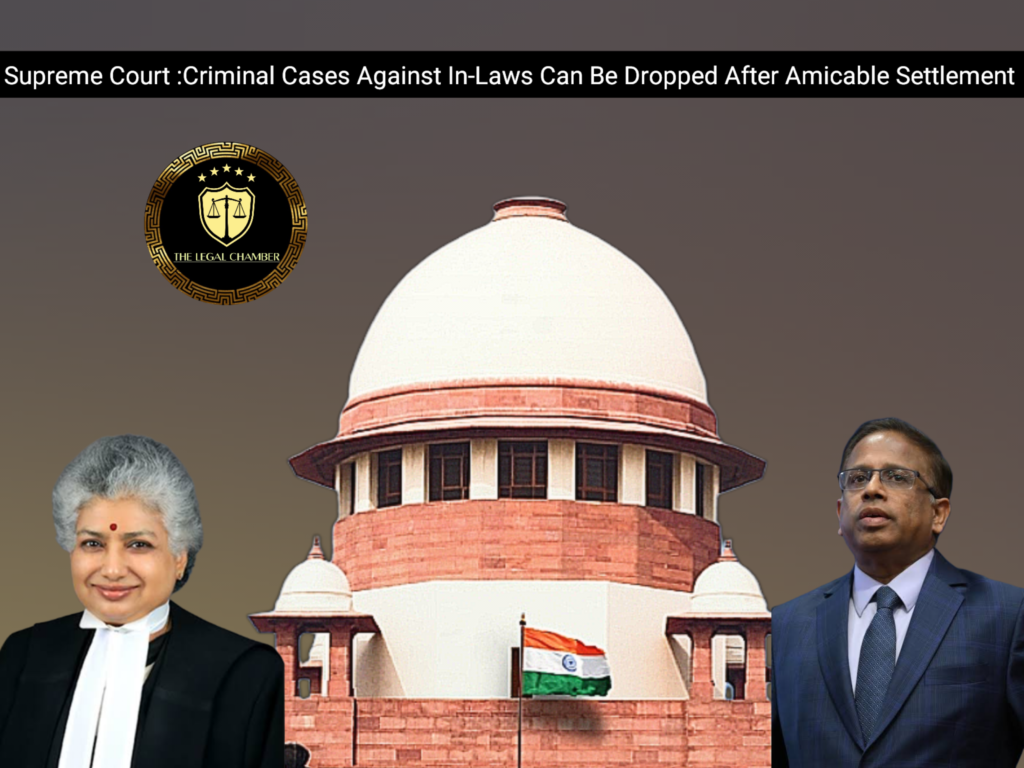
This Supreme Court, invoking Article 142 of the Constitution, quashed all criminal proceedings arising from matrimonial discord, including charges under Section 494 and 498A IPC. Relying on precedents, it held that continuing prosecution after a full and final settlement and divorce constitutes an abuse of the legal process and serves no legitimate purpose.
Facts Of The Case:
The marriage between the respondent-wife and the appellant’s brother was solemnized in 2001. The couple moved to the USA, but their relationship soured, leading to a mutual divorce decree from a California court in 2007. After returning to India, the wife initiated multiple legal proceedings against her husband and his family (the appellants). These included a complaint case alleging cruelty, a case under the Domestic Violence Act, and an FIR under Sections 494 (bigamy) and 498A (cruelty) of the IPC. The appellants approached the High Court to quash these proceedings, but their petitions were dismissed. Subsequently, the parties reached a comprehensive settlement before a Lok Adalat in 2022, resolving all their disputes, including a civil suit over a property. The terms of the settlement required the wife to withdraw all pending cases. Appealing to the Supreme Court, the appellants sought the quashing of the criminal cases based on this settlement.
Procedural History:
The procedural history began with the respondent-wife initiating multiple criminal proceedings, including an FIR under Sections 494 and 498A IPC, after a divorce was granted by a U.S. court. The appellants (husband’s family) filed petitions under Section 482 CrPC before the Andhra Pradesh High Court seeking to quash these proceedings. The High Court dismissed these petitions in a common order dated 30.03.2012. The appellants then appealed to the Supreme Court, which granted leave and stayed the proceedings. The parties were referred to mediation, which failed, but they later reached a full and final settlement before a Lok Adalat in 2022. The Supreme Court, invoking its power under Article 142 of the Constitution, ultimately allowed the appeals and quashed all criminal proceedings based on the settlement.
READ ALSO : Supreme Court Reinstates Drug Case: Acquittal Based on “Same Informant-Investigator” Rule Overturned
Court Observation:
The Court observed that criminal law should not be deployed as an instrument of harassment, especially against family members of the husband who are unnecessarily roped into matrimonial disputes. It emphasized that when a marriage has been dissolved by divorce and the parties have reached a full and final settlement of all their disputes, continuing criminal prosecution serves no legitimate purpose and amounts to an abuse of the process of law. Relying on precedents, the Court held that in such scenarios, exercising its extraordinary power under Article 142 of the Constitution to quash the proceedings is essential to do complete justice, prevent the misuse of the legal process, and bring quietus to the dispute.
Final Decision & Judgement:
The Supreme Court allowed the appeals and, in exercise of its powers under Article 142 of the Constitution of India, quashed FIR No.28 of 2011 registered under Sections 494 and 498A of the IPC and all consequent criminal proceedings emanating from the matrimonial dispute. The Court set aside the impugned order of the High Court, holding that the continuation of prosecution after the divorce and a full and final settlement between the parties would be an abuse of the process of law and would serve no fruitful purpose.
Case Details:
Case Title: Madduri Gangaraju @ Babu Rao vs. Madduri Sunanda & Others Citation: (2025) INSC 991 Criminal Appeal No.: Criminal Appeal Nos. 1802-1803 of 2013 Date of Judgement: July 30, 2025 Judges/Justice Name: Justice B.V. Nagarathna and Justice K.V. Viswanathan
Download The Judgement Here